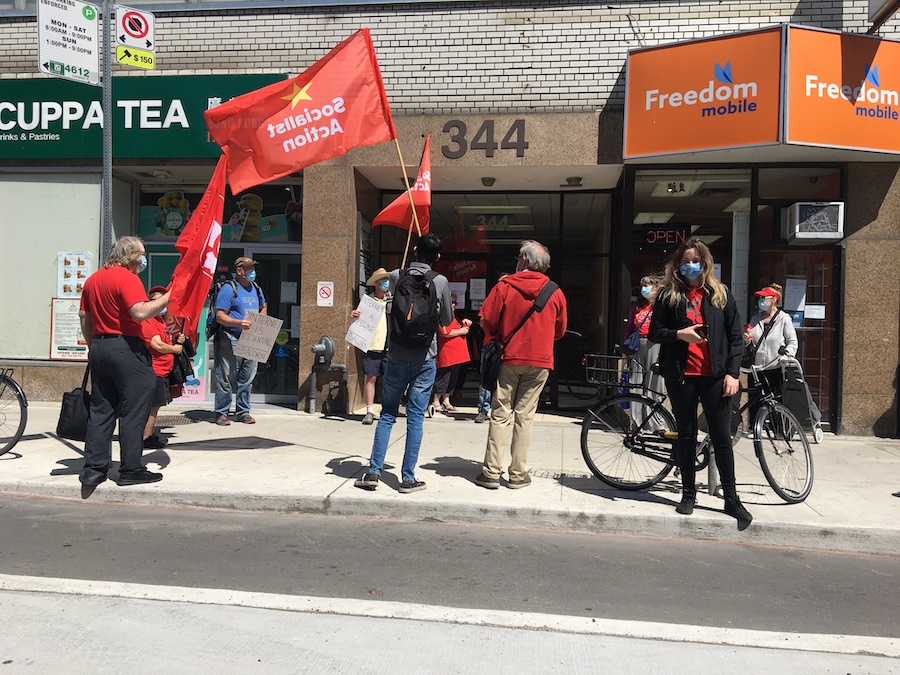Capital Current: ‘Do I pay the rent, do I take the internet?’ Protesters demand free online service
Posted June 22, 2020
ACORN Canada held rallies across the country on June 16 demanding free internet for all low-income Canadians during the COVID-19 pandemic.
Posted June 22, 2020
 ACORN Canada held rallies across the country on June 16 demanding free internet for all low-income Canadians during the COVID-19 pandemic.
ACORN Canada held rallies across the country on June 16 demanding free internet for all low-income Canadians during the COVID-19 pandemic.
The Internet for All campaign is also pushing for the expansion of the Connecting Families Program — a federal fund providing high-speed internet to eligible families for $10 per month — to include anyone who falls below the low-income line.
Demonstrators gathered outside the offices of Liberal MPs and federal ministers in Hamilton, Surrey, Ottawa, Halifax, London and Toronto. The Toronto protest took place outside the office of Deputy Prime Minister and federal Minister of Intergovernmental Affairs Chrystia Freeland, Liberal MP for University-Rosedale.
With the COVID-19 lockdown highlighting the importance of reliable internet access in homes and workplaces across Canada, ACORN is demanding universal internet access for the duration of the pandemic, followed by a six-month recovery period.
ACORN is an economic and social justice advocacy group that stands for Association of Community Organizations for Reform Now. It describes itself as an independent national organization of low- and moderate-income families with more than 130,000 members organized in 24 neighbourhood-scale chapters in nine Canadian cities.
Tough decisions
For many people, internet access means more than idly surfing the web, a fact made abundantly clear by the pandemic.
“Many people, for instance, have medical appointments. But all medical appointments, like at hospitals and clinics, are shut down,” said Alejandro Gonzalez Rendon, leader of the ACORN rally in Toronto.
Gonzalez Rendon explained that with many services now being offered remotely, certain people are left out. “If they don’t have internet, then they don’t have access to healthcare at all,” he said.
Last week, the Ottawa Board of Health declared systemic racism a public health issue and directed the Ottawa Public Health agency to implement various measures to combat this fundamental problem. The ACORN campaign highlights the fact that economic disparity is also a public health issue and requires measures to address the problem.
As the pandemic pushes the necessity of internet service, those who struggle to afford it are forced to make tough decisions.
“People have to make the decision now: ‘Do I pay the rent, do I take the internet? Do I put food on the table?’ ” said Gonzalez Rendon. “This is an essential infrastructure, like electricity, like roads, like public transportation. And people should be able to have that — if not free, at least be affordable. Because the entire economy is being built around that infrastructure,” he added.
New access for students
Just south of the ACORN rally, at the downtown campus of the University of Toronto, a new program has been launched to help students access the internet.
The Technology Access Service allows students enrolled at U of T to book a workspace in the Gerstein Science Information Centre, one of the university’s libraries.
“The concept is that it’s a service to support student access to either actual computer technology, or wi-fi, so they can use their computer, if they don’t have access to those things themselves,” said Sian Meikle, an associate chief librarian at the university.
In accordance with Toronto’s public health guidelines, users must follow physical distancing protocols.
Although there are 20 seats available for internet use at the centre, only 10 are used at a time. Each seat, booked for a maximum of three hours, can be used once a day, allowing for thorough cleaning.
Small classes and seminars may be able to convene come fall, but large lectures will be online.
Meikle said the university will adapt the service as public health guidelines progress, possibly admitting more students into the centre for the upcoming school year.
“As long as this service is needed, we plan for it to be available for any form of academic work.”
***
Article by Kevin O’Rourke McColl for Capital Current
